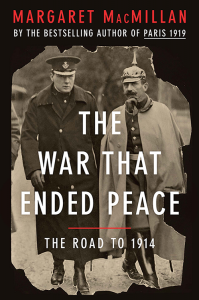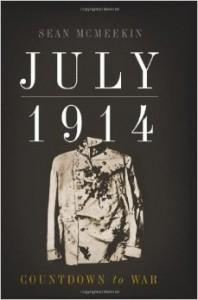Posted by Melody on Thursday, Jul 31, 2014
I confess: One of my favorite things to do in the evening is to prepare dinner while listening to NPR and drinking wine (wild life of the librarian, I know). On Monday, I had the pleasure of hearing Tom Ashbrook's On Point coverage of the 100th anniversary of the start of WWI.
I select books for the American History section of ICPL's collection, and Ashbrook's guests reflect some of the great research being published today about WWI. I'm happy to share that we have these new books in the collection. Check them out:
 Margaret MacMillan's The war that ended peace : the road to 1914
Margaret MacMillan's The war that ended peace : the road to 1914
Presents a narrative portrait of Europe in the years leading up to World War I that illuminates the political, cultural, and economic factors and contributing personalities that shaped major events.
 Sean McMeekin's July 1914 : countdown to war
Sean McMeekin's July 1914 : countdown to war
From Goodreads: As acclaimed historian Sean McMeekin reveals in July 1914, World War I might have been avoided entirely had it not been for a small group of statesmen who, in the month after the assassination, plotted to use Ferdinand’s murder as the trigger for a long-awaited showdown in Europe. The primary culprits, moreover, have long escaped blame. While most accounts of the war’s outbreak place the bulk of responsibility on German and Austro-Hungarian militarism, McMeekin draws on surprising new evidence from archives across Europe to show that the worst offenders were actually to be found in Russia and France, whose belligerence and duplicity ensured that war was inevitable.
Other new books about the start of WWI
Archduke Franz Ferdinand lives! : a world without World War I by Richard Ned Lebow
Catastrophe 1914 : Europe goes to war by Max Hastings
The sleepwalkers : how Europe went to war in 1914 by Christopher Clark
Happy history hunting!


We know mental health crises are a huge side effect of the COVID-19 pandemic. This book is for anyone experiencing secondary trauma while providing services or support to people living with their own trauma. I learned about this book from a webinar about library service, one that acknowledged public service work can have a negative impact on on the worker's mental health. Trauma Stewardship is an excellent guide for anyone working in public service, mental health, or even the school system. It's the serious side of "self-care" (you don't have to be in a bubble bath to get something out of it). Stuffing feelings down after experiencing a traumatic experience with the public you serve will leave you burnt out. This book provides the tools to create space to care for your own mental health. -Melody